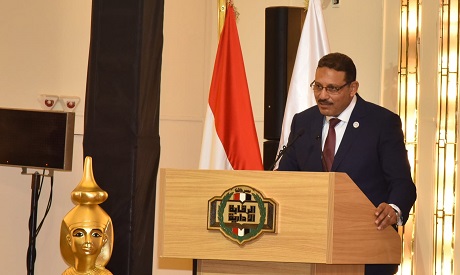
ACA chief Hassan Abdel-Shafy (photo courtesy of the ACA)
Hassan Abdel-Shafy, chief of the Administrative Control Authority (ACA) — Egypt’s highest anti-graft authority — has warned against the international phenomenon of corruption, saying it leads to destabilising communities and threatens sustainable development and human rights.
Abdel-Shafy’s remarks came as the ACA celebrated international anti-corruption day on 9 December. Prime Minister Mostafa Madbouly, as well as many ministers, ambassadors, and heads of Arab and international organisations were in attendance.
“Egypt has been among the first countries to join the UN’s convention against corruption, believing that corruption is no longer a local affair, but rather an international phenomenon,” Abdel-Shafy said.
“Today, we celebrate international anti-corruption day and tomorrow is human rights day. This stresses the link between preventing and combating corruption, and the right to live in an environment that is marked by integrity and transparency.”
Abdel-Shafy hailed Egypt’s anti-corruption efforts, referring to the establishment of the national committee to prevent and combat corruption and the launch of the country’s first national strategy to fight corruption between 2014 and 2018 and the second stage between 2019 and 2022.
This strategy has been launched “with a clear vision and with the aim to make a society that understands the dangers of corruption, rejects it, and raises the values of integrity.”
Egypt has formed the National Experts Committee, including representatives from law enforcement and the Foreign Ministry, to follow up on Egypt’s implementation of its counter-corruption national commitments, Abdel-Shafy said.
“As a result, the UN secretariat listed many successful practices for Egypt on its website, the most prominent of which is the national strategy.”
“Also, law enforcement agencies exchanged experiences and signed cooperation protocols with counterpart agencies, strengthened cooperation with the United Nations Office on Drugs and Crime, and international and regional organizations,” Abdel-Shafy added.
He referred to Egypt’s role in training 749 anti-corruption cadres in 25 African countries.
Short link: